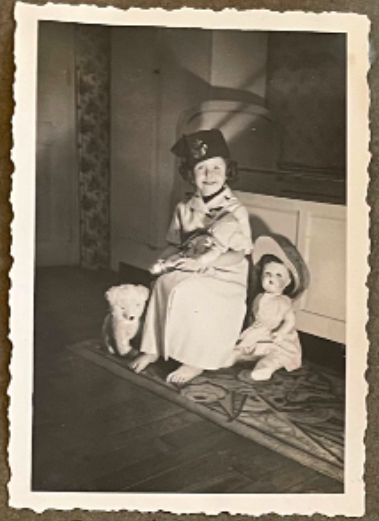
The Christophe family lives at 106 rue Cardinet in the 17th arrondissement. Robert and Marcelle come from the so-called Israelite, secular and republican bourgeoisie. With their only daughter, Francine, they form a close-knit family.
In the summer of 1940, Robert was captured and sent to a prison camp in Austria. In Paris, mother and daughter had to face the rampant anti-Semitic measures. At the end of July 1942, they tried to flee to the free zone. Arrested by the Germans in La Rochefoucauld, they were tossed from one French camp to another. Their status as spouse and daughter of a prisoner of war made them hostages, protecting them from deportation... until May 2, 1944 when they were taken to the Bergen-Belsen camp. There, Francine experienced the unspeakable. The family was finally reunited in June 1945. They returned to a Paris that had been liberated a year earlier, where things had returned to normal and there was no mention of the Shoah. "After the camps, life goes on" but how can one live like others when one has experienced the unimaginable? How to keep one's own memories and those of others who cannot share them when no one wants to hear them?
For a while, Francine scribbled down what haunted her and what came back to her on scraps of paper that she carefully put away. In 1967, she begins her stichwork: she reassembles her story by connecting all these scattered texts. This was to become the framework of her book From a World Apart. A Little Girl in the Concentration Camps published in 1996.
In 1995, Francine participated in the Shoah Foundation's initiative and told her story. Since then, she has continued to write and testify. Through her story, we discover not only a facet of history, but above all, we discover people, full of life, whose existence was erased. Or at least this is what some wanted but Francine is working to prevent it to happen.
Testimony from Francine Christophe
In 1995, Francine gave her testimony to the Shoah Foundation. The text below is a translation of her testimony, interspersed with excerpts from her parents' memoirs Une famille dans la guerre (1940-1945). This three-voice narrative attempts to reconstruct the historical and personal events experienced by the family. It also attempts to capture the inexhaustible love that bound together this trio, whose motto was, despite everything, "Life is beautiful".
This document is only a fragment of the memorial tapestry that Francine has been weaving ever since. When tied to the books she would later publish, it becomes the canvas on which the "privileged little girl" was able to bring the unimaginable to life so that it could not be erased and conveniently forgotten.
